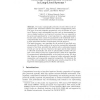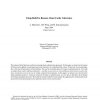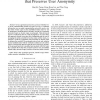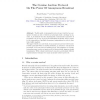253 search results - page 32 / 51 » Compositional Analysis of Authentication Protocols |
107
click to vote
CONCUR
2008
Springer
15 years 4 months ago
2008
Springer
Abstract. For many cryptographic protocols, security relies on the assumption that adversarial entities have limited computational power. This type of security degrades progressive...
121
click to vote
ECOWS
2007
Springer
15 years 4 months ago
2007
Springer
Key establishment is essential for many applications of cryptography. Its purpose is to negotiate keys for other cryptographic schemes, usually for encryption and authentication. I...
165
Voted
PODC
1994
ACM
15 years 6 months ago
1994
ACM
The notion of belief has been useful in reasoning about authentication protocols. In this paper, we show how the notion of belief can be applied to reasoning about cache coherence...
131
click to vote
ICC
2009
IEEE
15 years 9 months ago
2009
IEEE
—A key agreement protocol is a protocol whereby two or more communicating parties can agree on a key or exchange information over an open communication network in such a way that...
105
Voted
IH
1999
Springer
15 years 6 months ago
1999
Springer
Abstract. Traditionally, cryptographic protocols are described as a sequence of steps, in each of which one principal sends a message to another. It is assumed that the fundamental...




